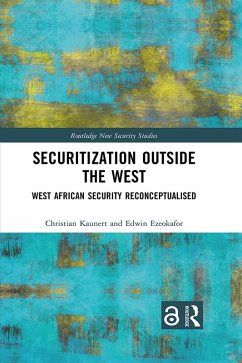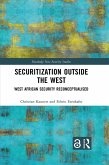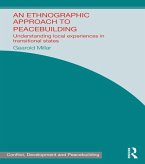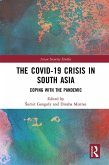This book analyses securitization processes outside of the West, with a focus on Africa.
The aim of the volume is to develop an original analytical framework to explain the securitization-neo-patrimonialism dynamics in West Africa, drawing upon insights from securitization theory, sociology and psychology. Among critical voices, securitization has become the gold standard for analysing emerging challenges, such as migration, terrorism, and human security. Yet, despite its broadening agenda, the framework has also been accused of bias, with a Western political context and democratic governance structure at its heart. This book aims to re-conceptualise the framework in a way that suits non-Western contexts better, notably by re-conceptualising the securitization-neopatrimonialism nexus in Africa, which gives us significant new insights into non-Western political contexts. It analyses the securitization processes among the political elites under neo-patrimonial statehood, and further stretches the conceptualisation of securitization into African statehood, which is characterised by a blurred line between the leader and the state. The volume explores the processes of securitizing threats in Liberia, Sierra Leone and wider West Africa, as well as the neo-patrimonial regimes of these states. In doing so, it explores the influence these states' neo-patrimonial regimes have on the processes of threat securitization.
This book will be of much interest to students of critical security studies, African politics and International Relations.
The Open Access version of this book, available at http://www.taylorfrancis.com, has been made available under a Creative Commons Attribution-Non Commercial-No Derivatives 4.0 license.
The aim of the volume is to develop an original analytical framework to explain the securitization-neo-patrimonialism dynamics in West Africa, drawing upon insights from securitization theory, sociology and psychology. Among critical voices, securitization has become the gold standard for analysing emerging challenges, such as migration, terrorism, and human security. Yet, despite its broadening agenda, the framework has also been accused of bias, with a Western political context and democratic governance structure at its heart. This book aims to re-conceptualise the framework in a way that suits non-Western contexts better, notably by re-conceptualising the securitization-neopatrimonialism nexus in Africa, which gives us significant new insights into non-Western political contexts. It analyses the securitization processes among the political elites under neo-patrimonial statehood, and further stretches the conceptualisation of securitization into African statehood, which is characterised by a blurred line between the leader and the state. The volume explores the processes of securitizing threats in Liberia, Sierra Leone and wider West Africa, as well as the neo-patrimonial regimes of these states. In doing so, it explores the influence these states' neo-patrimonial regimes have on the processes of threat securitization.
This book will be of much interest to students of critical security studies, African politics and International Relations.
The Open Access version of this book, available at http://www.taylorfrancis.com, has been made available under a Creative Commons Attribution-Non Commercial-No Derivatives 4.0 license.
Dieser Download kann aus rechtlichen Gründen nur mit Rechnungsadresse in A, B, BG, CY, CZ, D, DK, EW, E, FIN, F, GR, HR, H, IRL, I, LT, L, LR, M, NL, PL, P, R, S, SLO, SK ausgeliefert werden.









